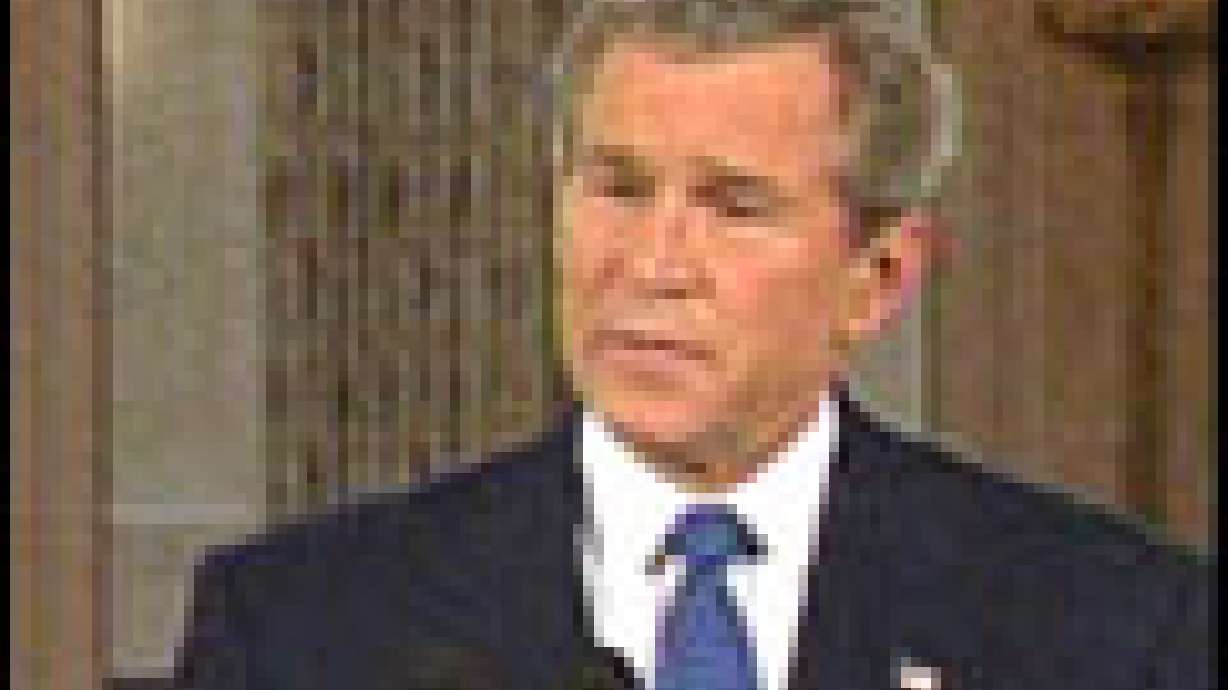Estimated read time: 4-5 minutes
This archived news story is available only for your personal, non-commercial use. Information in the story may be outdated or superseded by additional information. Reading or replaying the story in its archived form does not constitute a republication of the story.
WASHINGTON (AP) -- President Bush sought on Tuesday to rally international support for the transfer of power in Iraq, saying that even European leaders who opposed the war now "share the same goal" of a budding democracy.
Following a nationwide speech on Iraq, Bush spoke by phone Tuesday morning with French President Jacques Chirac, who has been one of the fiercest critics of U.S. policy there.
"What President Chirac and others have said is they want to make sure that the transfer of sovereignty to the interim government is a real transfer and that's what we want," Bush said in the Oval Office. where he met with Iraqi men whose right hands were cut off by Saddam Hussein regime.
"We want there to be a complete and real transfer of sovereignty so that the Iraqi citizens realize the fate of their country is now their responsibility," the president said.
"I had a great conversation with President Chirac," Bush said. "We share the same goal: a free and stable and peaceful Iraq."
Meanwhile in Berlin, Foreign Minister Joschka Fischer of Germany, another skeptical country, said Tuesday he believes the U.S.-British blueprint for the handover of sovereignty in Iraq provides a "very good foundation" for efforts to reach a consensus at the United Nations. The international body is considering a new resolution that would endorse the June 30 handover of power and authorize a U.S.-led multinational force to keep the peace.
Russian's foreign ministry, however, is being more cautious, saying it wants to see what Iraq's caretaker government looks like before it embraces the new security council resolution.
Secretary of State Colin Powell, at a news conference Tuesday, said other governments had not raised objections to the resolution proposed by the United States and Britain. But, Powell said, "I expect they will be suggesting changes."
During their meeting with Bush, the Iraqi men who lost their hands at Abu Grahaib prison near Baghdad said they wanted to "swing the hammer" when the prison is demolished, as Bush promised in his speech Monday night. Bush said the Abu Ghraib prison, notorious for torture under Saddam's regime and the scene of alleged prisoner abuse by U.S. troops, will be destroyed "as a fitting symbol of Iraq's new beginning."
In his address, Bush urged Americans and Iraqis alike to follow what he envisions as a path toward a stable, peaceful Iraq. But events out of his control could frustrate his five-step plan in coming weeks, and the president acknowledges "difficult days ahead."
The president, speaking at the Army War College in Carlisle, Pa., offered no exit strategy for bringing 138,000 American soldiers home, pledging instead to send more, if necessary.
"Terrorists will not determine the future of Iraq," Bush declared.
Bush, aiming his remarks at audiences both at home and abroad in Monday's prime-time speech, was trying to reverse growing doubts about the war, doubts that have dragged his approval ratings to the lowest point in his presidency. That has undercut what Bush's political advisers viewed as a strength heading into the election five months from now: his leadership in combating terrorism.
"I sent American troops to Iraq to defend our security, not to stay as an occupying power," he told a War College crowd more than 400, most of them Army officers in full dress uniform. "I sent American troops to Iraq to make its people free, not to make them American."
Democratic rival John Kerry said Bush's speech broke no new ground and "what's most important now is to turn these words into action by offering presidential leadership to the nation and to the world. That's going to require the president to genuinely reach out to our allies so the United States doesn't have to continue to go it alone and to create the stability necessary to allow the people of Iraq to move forward."
The president laid out a five-point plan to "achieve freedom
and peace in Iraq":
--Hand over authority to a sovereign Iraqi government.
--Help establish stability and security.
--Rebuild Iraq's infrastructure.
--Draw other countries into military and other operations.
--Move toward national elections by January.
But the insurgents in Iraq have been hampering such efforts, assassinating top Iraqi political leaders and harrying U.S. troops, destroying infrastructure by blowing up oil pipelines and stoking dissent among Iraqis about the legitimacy of the interim government.
"There are difficult days ahead, and the way forward may sometimes appear chaotic," Bush allowed. "The terrorists and Saddam loyalists would rather see many Iraqis die than have any live in freedom."
(Copyright 2004 by The Associated Press. All Rights Reserved.)








